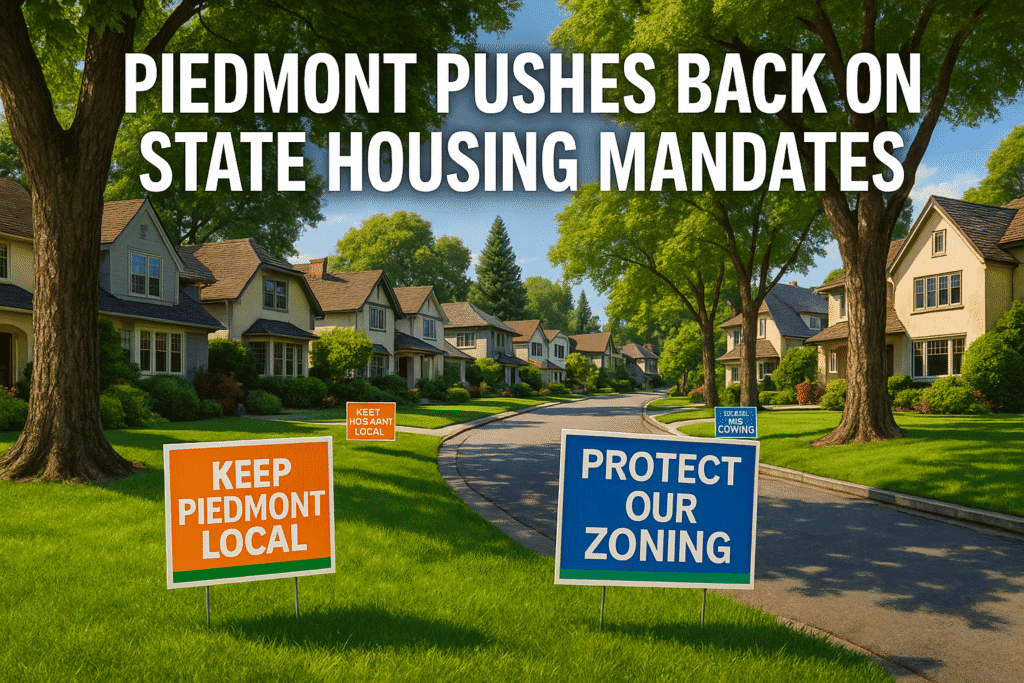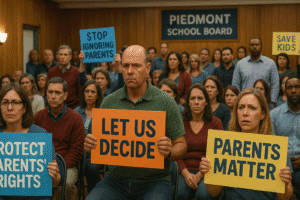Piedmont Pushes Back on State Housing Mandates


Piedmont, CA — Residents and officials in the quiet, tree-lined community of Piedmont are sounding the alarm as sweeping state housing mandates threaten to reshape local zoning laws and the character of this historic enclave. With Sacramento pushing for higher housing density—even in long-protected single-family neighborhoods—frustration is mounting over what many see as an assault on local control and the unique identity of their city.
State Mandates Meet Local Resistance
The controversy stems from recent California laws, including Senate Bill 9 (SB 9) and updated Regional Housing Needs Allocation (RHNA) requirements, which force cities like Piedmont to make room for hundreds of new housing units over the next decade. These mandates override traditional zoning practices, allowing for multi-unit development on parcels previously reserved for single-family homes.
For many in Piedmont, a city known for its stately homes, manicured gardens, and close-knit community, the changes represent a direct threat to the very qualities that make the town special.
“We moved to Piedmont for its charm, its safety, and its sense of community,” said longtime resident Anne Delaney, who spoke at a recent city council meeting. “Now, we’re being told by Sacramento that our voice doesn’t matter and that we have to accept whatever density the state dictates.”
City Officials Voice Concerns
Piedmont city officials have been vocal in their opposition to the mandates, arguing that the new requirements undermine local governance and ignore the realities of small, built-out cities. At a recent public meeting, Mayor Betsy Andersen expressed frustration with the lack of flexibility offered by the state.
“Our community is not opposed to doing our fair share to address the housing crisis,” Andersen said. “But these laws take a one-size-fits-all approach that doesn’t work for unique communities like ours. We need solutions that respect local context, not blanket mandates.”
The city’s planning staff has also warned that increased density could strain infrastructure and schools, while creating parking and traffic headaches in narrow, historic neighborhoods.
Residents Mobilize to “Keep Piedmont Local”
In response to the state’s push, grassroots groups have sprung up across Piedmont, distributing lawn signs with slogans like “Keep Piedmont Local” and “Protect Our Zoning.” Residents are organizing petitions, attending council meetings, and speaking out in local forums.
“We’re not NIMBYs—we just want a say in what happens to our city,” said Mark Wu, who is helping coordinate a neighborhood coalition. “We already have a good record on adding accessory dwelling units and supporting gentle growth. But wholesale zoning changes will destroy the character and livability of Piedmont.”
For many, the concern is not just about housing numbers, but about the loss of local voice and self-determination—a sentiment echoed by school board member Sarah Pearson: “Every community deserves to have a seat at the table when it comes to major changes in land use and density. State mandates shouldn’t erase decades of thoughtful local planning.”
A Question of Character
Critics of the mandates argue that Piedmont’s size and geography make it ill-suited to the kind of high-density development envisioned by state legislators. With narrow, winding streets, limited public transit, and historic architecture, the city’s infrastructure was simply not designed to accommodate large apartment complexes or mass redevelopment.
“We have no vacant land, and our schools are already at capacity,” said Planning Commissioner John Keating. “Increasing density without proper planning will erode our quality of life and put undue pressure on our community resources.”
Supporters of the mandates, including some younger residents and housing advocates, argue that all cities need to do their part to address California’s housing shortage, but even among this group, there is widespread agreement that the state’s approach lacks nuance.
Next Steps: Legal and Political Challenges
Piedmont officials are exploring all options, including legal action and lobbying for more flexible legislation. The city has also joined regional coalitions advocating for local control in the face of state overreach.
In the meantime, the city council is working to comply with the letter of the law while minimizing the impact on Piedmont’s neighborhoods. This includes carefully selecting sites for new housing, emphasizing accessory dwelling units over large multi-family complexes, and prioritizing community input throughout the process.
The Road Ahead
As the debate continues, it is clear that Piedmont’s residents and leaders are not backing down. Lawn signs and spirited council meetings have become a regular feature of civic life, reflecting a community determined to protect its heritage and its right to self-govern.
“We want to be part of the solution,” said Mayor Andersen. “But the solution must come from within our community, not from mandates handed down from above.”












